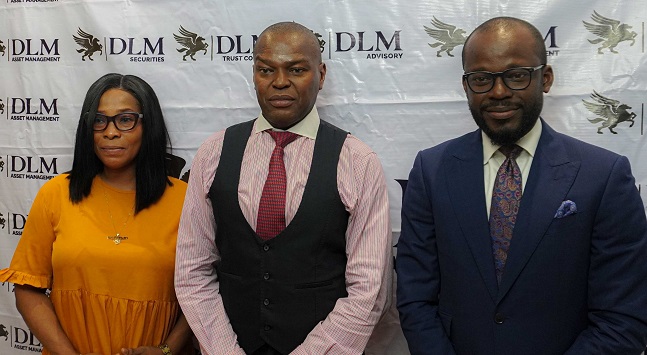E-Financial
Sustaining Financial Inclusion Through Viable Agent Network

By Fasasi Sarafadeen Atanda
As it is today, financial inclusion is stakeholders’ slogan; the awareness has been created Agents are everywhere, but there is a threat and that threat is agent viability. There is no doubt about it all the stakeholders, such the banks, the MNO, MMO have realized that agents play very key role in delivering digital financial services.

If you look at all the strategies of the mobile network operators, mobile money operators and the banks you will find aggregators that show that agents are key in delivering strategy.
If agents are key how then do we make agents viable? My experience has shown that we have high rate of agents’ turnover as a major challenge at the same time provider performance instability as also a major issue. So, we have two major issues that will help to sustain financial inclusion.
Agents’ turnover rate is too high and also the providers or principal, their performance is also not stable. What I mean by that is, on the agents part of turnover, my visit to the field confirmed that the agents that the providers have invested in training, marketing, on boarding in the last three years, greater percentage of them are no longer in business.
That is a waste of resources. They now have new agents that they need to also train and brand again.
I am sure in the next one year if you visit those locations you will find a new sets of agents. In this situation, we are turning over experiences which are not going to lead into sustainability.
What are those things that are responsible for this? First is general skill-set or capacity. What we have is individual provider training agents which is good, if you are agents of Paga, Paga will train you; if you are agents of Opay, Opay will train you.
If you look at the content of the training it is specific to their platform, it is about how to transact on their platform, dispute resolution on their platform, and it is really not about profitability and knowledge of the business.
Actually, viability of agents is determined by making agency banking or agent network a business and not as a service. They don’t train agents on how they will be productive or cost analysis structure.
Training of agents should be handled by a neutral body or training consultants, to be able to deliver cost benefit training on the agents. Even if you are agents of operator A or agents of operator B you will be trained on how to cover your cost as well as how to remain in business.
As at today, SANEF has been playing that role; we want them to do more, they are in the best position to provider general knowledge in training of agents.
Secondly, is what I called platform quality; here we have mobile App platform, and POS Channel platform. This is a major factor responsible for agents’ turnover, by the time you rout transaction through a platform that has not been tested and certified good, you run into trouble and lose your money, this makes agents to be discouraged in the business and before you know it they will close shop.
For instance, if you are transacting with N100,000 capital and you find yourself transacting on a particular provider’s platform of inferior quality because of lack of security. We need to find out if such platforms are secured and feasible. Can you see the money you put in and the money going out? That is transaction history.
Again, what is the time of resolution of dispute and the channel of dispute resolution? Who is supervising this? We need to start certifying any transaction platform that will be used by agents. This has to do with involving stakeholders that have been able to work with all the platforms.
Thirdly is the support system, we have seen a situation where the principal for example, a bank with an agent network. The agent will come to a bank and won’t have a fair treatment in terms of say I want to quickly get cash and go back to location, No. Banks don’t see their agents as agents they want them to go and queue up in line like other customers. This discourages agents as they will spend the whole day in the bank.
This is contrary to what obtains in some Asian and South American countries where financial inclusion is flying, in those environments, the principals are supporting the agents. In Brazil, a bank opens a ‘Till account’ for the agents with a limit, as agents are transacting they don’t need to be looking for money up and down, they are transacting from the ‘Till account’ a sort of an advance. But, here there is no support from the principals.
Multiple taxes: Local government and state government are coming to agent location for one levy or the other. You can’t imagine State government revenue agents are coming, LCDA and LGA agents are coming to a single kiosk. It is worst these days as local government are looking for revenue everywhere, they have now printed a special receipt they called permit for POS.
It is important we borrow a leaf from countries like Uganda and Tanzania where there is a direct statement from central bank of those countries that certain categories of financial inclusion at the level of agents are excluded from these obnoxious taxes. I have closed about three locations in Niger State, five in Kaduna because every day local government harass us for one levy or the other.
On provider performance instability: If you check the statistics, the top five providers MMO, MNO in the past five years, they are not among the top ten today. Why?
A provider that can boast of 70,000 to 100,000 agents today they have crashed to 5,000 some are struggling for 2,000 agents. We need to find out why agents are closing shops.
Among the reasons are: 1. Most of them roll out without pilot even when they are doing pilot it is done within their office and they won’t get agents in the field involved for a proper product design feedback in order to know what the market requires.
I have witnessed a provider that rolled out agency platform believing that they are everywhere, unfortunately when they rolled out we discovered that their platform lack feasibility no agent history. You can’t view your transaction history. You don’t have feasibility into your transaction and they have spent so much money and can’t recall it again, imagine investment that has gone the drained. Today, they are not among the first ten providers because they have lost so much money.
Also in the strategy, I have checked through a lot of providers’ strategy across the channels; the MMO, MNO and the Banks led, I discovered that they don’t engage the practitioners before they design their strategy and their strategies have always be the same.
If you look at commission structure and on boarding processes, they are all the same, so the mistake of one is been repeated in the other. Strategy of agency banking is not cast in stone you have to look at what is obtainable in the market. These are some of the causes of the downfall of most of the providers.
Also the feedback channel, most of them don’t want to listen to feedback. I have seen providers’ WhatApp group platform where they are the only one authorised to give out information, agents cannot comment. This is funny. On their platform, they will add you as their agent but you cannot write anything there. It is only for passing of information to agents. How would they know what is happening in the market, how would they listen to complains? How would they get feedback to improve on their system?
More so, their objective is more of ‘Profit-centric’, in one year you want to recoup your investment, because of this that they give unrealistic targets to their staff, “On board” “On board” before you know it, they on board nonsense for them and as they are on boarding, people are disembodying.
The most successful financial inclusion organisation in Africa is Mpesa in Kenya. In their first year they did not sell any product, they only registered 400 agents compared to providers in Nigeria where in their first year they want to hit 100,000 agents. Providers in Nigeria should be Customer-centric and not Profit-centric.
They should try as much as possible to make sure that people accept their product and sale value to them if you want to retain them. Agents’ retention is nearly zero in Nigeria that is why you see agents on board today and tomorrow dis-on board.
On dispute resolution channels, today most of the MNO if they want to deploy terminals or retrieve PoS from agents, there are no define guard lines, some of them will lock some of their agents wallet so that they don’t have access to the funds again so that he can come to them and they will collect their terminal.
There should be human face to everything, today there are some MNO that throw in debit to agents account without notification, when you inquire they say it is charges of non-performance. Because you are not using their PoS very well they will debit you for the cost of the PoS. MNOs are behaving as if there are no regulation in the system.
Fasasi Sarafadeen Atanda is chief executive officer of partner de Ecosystem, an agent network management company.
E-Financial
Sofri Microfinance Bank Rejig Digital Platforms for Better Customer Experience

Sofri microfinance bank plans a massive rollout of Point of Sale, PoS terminals for merchants and agency banking in the third quarter of this year.

This is coming against the backdrop of the banks revamp of its digital platforms to support better customer experience.
Paul Adebayo, managing director, Sofri Microfinance Bank, said the bank is technology and purpose-driven, with focus on financial inclusion and sustainability. As well with the determination of making banking simpler, inclusive, and impactful.
He said that the revamped mobile app features, faster onboarding, cleaner interface, real-time alerts, enhanced security and seamless loan applications.
“Our corporate internet banking Launched for SMEs and institutional clients features, secure payments, transfers, account management and enhances business banking experience.
“Laying the groundwork for greater reliability, product innovation and operational efficiency is our new core banking infrastructure. This change enables us to scale faster and serve customers better.
“Our Terminal Management System (TMS) improves the performance, uptime, and remote monitoring of our POS terminals. This ensures merchants and field agents enjoy better stability, quicker settlements, and stronger support,” he added.
On sustainability impact, Adebayo, added that Sofri Microfinance bank is embedding ESG principles into its lending and operational models — from offering green financing options, to supporting waste-to-wealth entrepreneurs, and making inclusive finance part of Nigeria’s circular economy.
Sofri is a trademark of Links Microfinance Limited (Links Mfb). Links Mfb is licensed and regulated by Central Bank of Nigeria (CBN) and deposits insured by the Nigeria Deposit Insurance Corporation (NDIC). Links Mfb is a member of DLM Capital Group, owners of DLM Asset Management as regulated by the Securities and Exchange Commission (SEC).
E-Financial
DLM Group Unveils Innovative Sovereign Bond Backed Composite Notes

Current market research has confirmed that buyside investors are increasingly focused on high-growth sectors such as small businesses and consumer lending— sectors that fuel both the demand and supply sides of the economy.

However, capital allocation to these areas requires robust risk mitigation frameworks to preserve principal and ensure returns that are not just economically viable but outpace inflation.
Against the backdrop that DLM Capital Group has developed an innovative solution – the Sovereign Bond Backed Composite Notes (SBCNs) to meet this critical economy needs.
According to Sonnie Babatunde Ayere, the Group CEO of DLM Capital Group, “We believe that the consistent issuance of SBCNs by qualified entities will play a key role in de-risking corporate bond portfolios.
“By blending sovereign-backed security with enhanced yield exposure, portfolio managers gain a rare opportunity to simultaneously increase portfolio safety and performance”.
The first of its kind fixed income product combines the security of direct sovereign bond-backed principal protection, such as FGN Bonds, with the enhanced yield potential of corporate and consumer lending cash flows. This hybrid structure, the first of its kind in the local market, merges public-sector credit safety with private-sector income generation.
The instrument is designed as such that the private sector credit tranche will be secured by the FGN-bonds, which will be the senior tranche.
The N30 billion Sovereign Bond Backed Composite Notes issued by DLM Funding SPV Plc is being packaged as a AAA-rated note. With a held-to-maturity yield of 49.9 percent, the notes are designed to be attractive to institutional investors seeking a balance between capital preservation and superior returns.
Sonnie Babatunde Ayere, noted about the SBCN, “For asset managers, it enhances portfolio quality, improves credit profiles, supports diversification, and delivers competitive returns.
In a media parley describing the instrument, Ayere highlighted the role of the instrument in driving credit expansion to the underserved private sector. He highlighted how the note could help drive institutional capital into sectors that were previously considered too risky.
“By channeling domestic capital into these critical but underserved sectors without exposing investors to excessive risk, it becomes possible to mobilize funding for parts of the economy that have long been neglected.” He added.
E-Financial
Fidelity MD,Onyeali-Ikpe Champions Lifelong Learning and Sisterhood for Women’s Career Growth

Dr. Nneka Onyeali-Ikpe, Managing Director and Chief Executive Officer of Fidelity Bank Plc, has encouraged women professionals to embrace continuous learning, courage, and collaboration as key habits for achieving long-term career success and breaking through professional barriers.

Managing Director and Chief Executive Officer of Fidelity Bank Plc, Dr. Nneka Onyeali-Ikpe, OON, (Middle) flanked by participants of a Women’s Roundtable themed, “Mentorship with Dr. Nneka Onyeali-Ikpe” hosted by the bank over the weekend at the Fidelity SME Hub, Gbagada, Lagos recently.
She gave the charge during a Women’s Roundtable hosted by the bank over the weekend at the Fidelity SME Hub in Gbagada, Lagos. Themed “Mentorship with Dr. Nneka Onyeali-Ikpe”, the event drew female professionals from various sectors and was held under the Recognition and Networking arm of the bank’s HerFidelity Proposition—a flagship initiative designed to empower women entrepreneurs and professionals across Nigeria.
Explaining the vision behind HerFidelity, Dr. Onyeali-Ikpe noted that the initiative was born out of a strong need to provide women with holistic support beyond access to finance.
“In my engagements with women across different industries, I’ve seen first-hand that while talent and ambition abound, many still lack access to capital, skills development, health support, and networks,” she said.
“HerFidelity was created to bridge that gap by focusing on four key pillars: access to capital, capacity building, wellness for work-life balance, and entrepreneurship support. It’s one of the initiatives I’m most proud of, because when women thrive, communities prosper and economies flourish.”
The interactive mentorship session, held in a Q&A format, offered participants an opportunity to learn directly from the trailblazing CEO, who shared personal experiences and career insights.
Advising young women aspiring to leadership, she said: “Believe in yourself, be ready to work hard, and never shy away from taking smart risks. Seek out mentors, invest in meaningful relationships, and above all, collaborate—because no one truly succeeds alone.”
The event also featured fun competitions and giveaways, with attendees winning exciting gifts courtesy of Fidelity Bank.
Dr. Onyeali-Ikpe’s session left participants inspired, reinforcing Fidelity Bank’s position as a champion for gender empowerment and a leading supporter of women’s advancement in business and leadership.

 General News2 days ago
General News2 days agoNASRDA, Galaxy Space Firm Sign MoU on Satellite Connectivity

 Telecom2 days ago
Telecom2 days agoOver 1m Nigerians Reached through MTN Staff’s Digital and Community Outreach

 Telecom2 days ago
Telecom2 days agoMafab Gets 0724 Number Series, Launches Mcom 5G Brand

 News2 days ago
News2 days agoDBN Awards N13m in Grants to Tech Startups

 Telecom2 days ago
Telecom2 days agoNCC to Name, Shame Telecom Infrastructure Vandals

 News2 days ago
News2 days agoFCCPC Shuts France, Belgium, and Italy Visa Centres in Abuja Over Alleged Consumer Rights Violations

 Telecom2 days ago
Telecom2 days agoWSIS Review: Nigerian ICT Leaders Urged to Shape Global Digital Future

 E-Financial2 days ago
E-Financial2 days agoBank Customers Petition CBN over Illegal Deductions, Demand Action


























